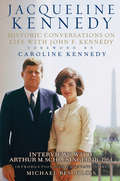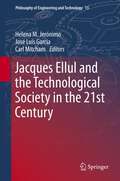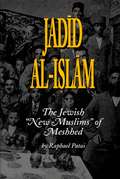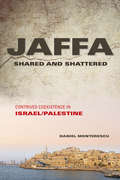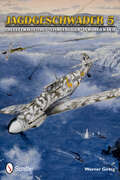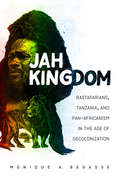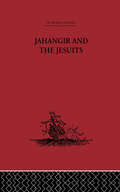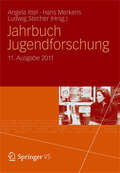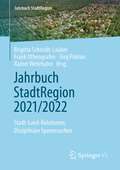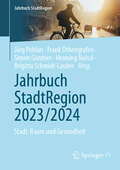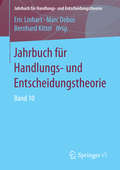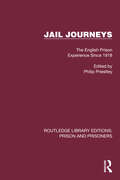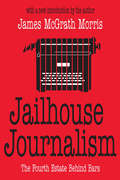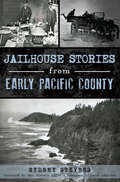- Table View
- List View
Jacqueline Kennedy: Historic Conversations on Life with John F. Kennedy
by Caroline KennedyIn 1964, Jacqueline Kennedy recorded seven historic interviews about her life with John F. Kennedy. Now, for the first time, they can be read in this deluxe, illustrated eBook.Shortly after President John F. Kennedy's assassination, with a nation deep in mourning and the world looking on in stunned disbelief, Jacqueline Kennedy found the strength to set aside her own personal grief for the sake of posterity and begin the task of documenting and preserving her husband's legacy. In January of 1964, she and Robert F. Kennedy approved a planned oral-history project that would capture their first-hand accounts of the late President as well as the recollections of those closest to him throughout his extraordinary political career. For the rest of her life, the famously private Jacqueline Kennedy steadfastly refused to discuss her memories of those years, but beginning that March, she fulfilled her obligation to future generations of Americans by sitting down with historian Arthur Schlesinger, Jr., and recording an astonishingly detailed and unvarnished account of her experiences and impressions as the wife and confidante of John F. Kennedy. The tapes of those sessions were then sealed and later deposited in the John F. Kennedy Presidential Library and Museum upon its completion, in accordance with Mrs. Kennedy's wishes.The resulting eight and a half hours of material comprises a unique and compelling record of a tumultuous era, providing fresh insights on the many significant people and events that shaped JFK's presidency but also shedding new light on the man behind the momentous decisions. Here are JFK's unscripted opinions on a host of revealing subjects, including his thoughts and feelings about his brothers Robert and Ted, and his take on world leaders past and present, giving us perhaps the most informed, genuine, and immediate portrait of John Fitzgerald Kennedy we shall ever have. Mrs. Kennedy's urbane perspective, her candor, and her flashes of wit also give us our clearest glimpse into the active mind of a remarkable First Lady.In conjunction with the fiftieth anniversary of President Kennedy's Inauguration, Caroline Kennedy and the Kennedy family are now releasing these beautifully restored recordings on CDs with accompanying transcripts. Introduced and annotated by renowned presidential historian Michael Beschloss, these interviews will add an exciting new dimension to our understanding and appreciation of President Kennedy and his time and make the past come alive through the words and voice of an eloquent eyewitness to history.
Jacqueline du Pré: A Life
by Carol EastonBiography of the English cellist, one of the world's greatest cellists, a legend in her own lifetime.
Jacques Ellul and the Technological Society in the 21st Century
by Carl Mitcham Helena M. Jerónimo José Luís GarciaThis volume rethinks the work of Jacques Ellul (1912-1994) on the centenary of his birth, by presenting an overview of the current debates based on Ellul's insights. As one of the most significant twentieth-century thinkers about technology, Ellul was among the first thinkers to realize the importance of topics such as globalization, terrorism, communication technologies and ecology, and study them from a technological perspective. The book is divided into three sections. The first discusses Ellul's diagnosis of modern society, and addresses the reception of his work on the technological society, the notion of efficiency, the process of symbolization/de-symbolization, and ecology. The second analyzes communicational and cultural problems, as well as threats and trends in early twenty-first century societies. Many of the issues Ellul saw as crucial - such as energy, propaganda, applied life sciences and communication - continue to be so. In fact they have grown exponentially, on a global scale, producing new forms of risk. Essays in the final section examine the duality of reason and revelation. They pursue an understanding of Ellul in terms of the depth of experience and the traditions of human knowledge, which is to say, on the one hand, the experience of the human being as contained in the rationalist, sociological and philosophical traditions. On the other hand there are the transcendent roots of human existence, as well as "revealed knowledge," in the mystical and religious traditions. The meeting of these two traditions enables us to look at Ellul's work as a whole, but above all it opens up a space for examining religious life in the technological society.
Jacques Lacan and Feminist Epistemology (Transformations)
by Kirsten CampbellThis book outlines a compelling new agenda for feminist theories of identity and social relations. Using Lacanian psychoanalysis with feminist epistemology, the author sets out a groundbreaking psychoanalytic social theory. Campbell's work offers answers to the important contemporary question of how feminism can change the formation of gendered subjectivities and social relations. Drawing on the work of third wave feminists, the book shows how feminism can provide new political models of knowing and disrupt foundational ideas of sexual identity.Kirsten Campbell engages the reader with an original intepretation of Lacanian psychoanalysis and offers a compelling argument for a fresh commitment to the politics of feminism. Jacques Lacan and Feminist Epistemology will be essential reading for anyone with interests in gender studies, cultural studies, psychoanalytic studies or social and political theory.
Jade Dragon
by Sarah Milledge NelsonThis teaching novel is an archaeological suspense story set in northeast China at a site that is called the Goddess Temple. Clara, protagonist of Nelson’s Spirit Bird Journey, begins work at an excavation at the Temple, only to discover the problems of contemporary looting, government meddling, and excavation interpersonal dynamics. Nelson’s story also describes the lifeways of the Neolithic people who used the temple thousands of years ago—their economy, social structure, gender relations, and religious rituals—through the eyes of a young woman living there. Written by a leading American archaeologist specializing in these topics, this volume is both a good read and good archaeology. An ideal starting point to introduce archaeology to college students.
Jadid al-Islam: The Jewish “New Muslims” of Meshhed (Raphael Patai Series in Jewish Folklore and Anthropology)
by Raphael PataiIn 1839, Muslims attacked the Jews of Meshhed, murdering 36 of them, and forcing the conversion of the rest. While some managed to escape across the Afghan border, and some turned into true believing Muslims, the majority adopted Islam only outwardly, while secretly adhering to their Jewish faith. Jadid al-Islam is the fascinating story of how this community managed to survive, at the risk of their lives, as crypto-Jews in an inimical Shi'i Muslim environment. Based on unpublished original Persian sources and interviews with members of the existing Meshhed community in Jerusalem and New York, this study documents the history, traditions, tales, customs, and institutions of the Jadid al-Islam--"New Muslims."
Jaffa Shared and Shattered
by Daniel MonterescuBinational cities play a pivotal role in situations of long-term conflict, and few places have been more marked by the tension between intimate proximity and visceral hostility than Jaffa, one of the "mixed towns" of Israel/Palestine. In this nuanced ethnographic and historical study, Daniel Monterescu argues that such places challenge our assumptions about cities and nationalism, calling into question the Israeli state's policy of maintaining homogeneous, segregated, and ethnically stable spaces. Analyzing everyday interactions, life stories, and histories of violence, he reveals the politics of gentrification and the circumstantial coalitions that define the city. Drawing on key theorists in anthropology, sociology, urban studies, and political science, he outlines a new relational theory of sociality and spatiality.
Jagdgeschwader 5: The Luftwaffe’s JG 5 “Eismeerjäger” in World War II
by Werner GirbigFirst English language edition of the definitive JG 5 history
Jaguars of the Dawn: Spirit Mediumship in the Brazilian Vale do Amanhecer
by Emily PieriniThe Brazilian Spiritualist Christian Order Vale do Amanhecer (Valley of the Dawn) is the place where the worlds of the living and the spirits merge and the boundaries between lives are regularly crossed. Drawing upon over a decade of extensive fieldwork in temples of the Amanhecer in Brazil and Europe, the author explores how mediums understand their experiences and how they learn to establish relationships with their spirit guides. She sheds light on the ways in which mediumistic development in the Vale do Amanhecer is used for therapeutic purposes and informs notions of body and self, of illness and wellbeing.
Jaguars of the Dawn: Spirit Mediumship in the Brazilian Vale do Amanhecer
by Emily PieriniThe Brazilian Spiritualist Christian Order Vale do Amanhecer (Valley of the Dawn) is the place where the worlds of the living and the spirits merge and the boundaries between lives are regularly crossed. Drawing upon over a decade of extensive fieldwork in temples of the Amanhecer in Brazil and Europe, the author explores how mediums understand their experiences and how they learn to establish relationships with their spirit guides. She sheds light on the ways in which mediumistic development in the Vale do Amanhecer is used for therapeutic purposes and informs notions of body and self, of illness and wellbeing.
Jah Kingdom: Rastafarians, Tanzania, and Pan-Africanism in the Age of Decolonization
by Monique A. BedasseFrom its beginnings in 1930s Jamaica, the Rastafarian movement has become a global presence. While the existing studies of the Rastafarian movement have primarily focused on its cultural expression through reggae music, art, and iconography, Monique A. Bedasse argues that repatriation to Africa represents the most important vehicle of Rastafari's international growth. Shifting the scholarship on repatriation from Ethiopia to Tanzania, Bedasse foregrounds Rastafari's enduring connection to black radical politics and establishes Tanzania as a critical site to explore gender, religion, race, citizenship, socialism, and nation. Beyond her engagement with how the Rastafarian idea of Africa translated into a lived reality, she demonstrates how Tanzanian state and nonstate actors not only validated the Rastafarian idea of diaspora but were also crucial to defining the parameters of Pan-Africanism. Based on previously undiscovered oral and written sources from Tanzania, Jamaica, England, the United States, and Trinidad, Bedasse uncovers a vast and varied transnational network--including Julius Nyerere, Michael Manley, and C. L. R James--revealing Rastafari's entrenchment in the making of Pan-Africanism in the postindependence period.
Jahangir and the Jesuits: With an Account of the Benedict Goes and the Mission to Pegu
by From the GuerreiroFirst published in 1930. 'The book is full of splendour and strange scenes' NationThe Relations of Fernão Guerreiro, from which the three narratives in this volume have been taken, constitute a complete history of the missionary undertakings of the Society of Jesus in the East Indies, China, Japan and Africa during the first decade of the seventeenth century. The work was compiled from the annual letters and reports sent to Europe from the various missionary centres. The original work, which until this edition was published in 1930, had never been reprinted. The only complete copy exists in the British Museum Library, in London.
Jahrbuch Jugendforschung
by Angela Ittel Ludwig Stecher Hans MerkensDie aktuelle Ausgabe des Jahrbuchs Jugendforschung beschäftigt sich im ersten seiner Schwerpunkte mit der Bedeutung der Jugendphase für die spätere Erwachsenenbiografie. Auf der Basis von - teilweise mehrere Jahrzehnte umspannenden - Längsschnittstudien wird empirisch der Frage nachgegangen, wie aussagekräftig Daten aus der Jugendphase tatsächlich für das spätere Leben als Erwachsener sind. Während mit Blick auf die Jugend in der Öffentlichkeit immer wieder problematisches Verhalten Jugendlicher - wie etwa Gewalt, Alkohol oder Risikoverhalten - akzentuiert wird, setzt das Jahrbuch Jugendforschung in seinem zweiten thematischen Schwerpunkt einen Kontrapunkt zu dieser Debatte, indem es sich explizit mit erfolgreichen Jugendlichen auseinander setzt. Hierzu gehören u. a. (hoch-)begabte Jugendliche, oder Jugendliche, die trotz schwieriger Ausgangsbedingungen hohe Bildungserfolge erreichen. In der ersten Ausgabe 2001 hatte das Jahrbuch namhafte JugendforscherInnen gebeten, über den Stand und die Zukunft der Jugendforschung nachzudenken. In der aktuellen Ausgabe, 10 Jahre danach, nehmen einige der damaligen AutorInnen dazu erneut Stellung.
Jahrbuch StadtRegion 2021/2022: Stadt-Land-Relationen. Disziplinäre Spurensuchen (Jahrbuch StadtRegion)
by Rainer Wehrhahn Jörg Pohlan Frank Othengrafen Brigitta Schmidt-LauberDas vorliegende Jahrbuch StadtRegion 2022 thematisiert die Beziehungen zwischen Stadt und Land nicht entlang geläufiger, unhinterfragter Dichotomien. Vielmehr werden Verflechtungen, Auflösungen und Dynamisierungen derartiger dichotomer Kategorien in den Vordergrund gestellt.
Jahrbuch StadtRegion 2023/2024: Stadt, Raum und Gesundheit (Jahrbuch StadtRegion)
by Simon Güntner Jörg Pohlan Frank Othengrafen Brigitta Schmidt-Lauber Henning NuisslDas Thema Gesundheit hat in den vergangenen Jahren immer mehr an Bedeutung gewonnen. Das vorliegende Jahrbuch behandelt den Zusammenhang zwischen Stadt- und Regionalentwicklung und Gesundheit aus verschiedenen disziplinären Perspektiven sowie anhand von Fallbeispielen aus unterschiedlichen Städten und Stadtregionen. Lebenswerte und gesundheitsfördernde Städte und Gemeinden gelten als zentrales Ziel einer nachhaltigen Stadtentwicklung und damit gleichzeitig auch als wesentliche Zukunftsaufgabe. Die aktuellen Diskussionen zu Gesundheit im städtischen Raum knüpfen an Megatrends wie den demografischen und klimatischen Wandel an, thematisieren aber auch den Zusammenhang mit Migration, sozialer Ungleichheit und sozialräumlich unterschiedlich ausgeprägten Entwicklungsprozessen insbesondere in den Stadtregionen. Als eine weitere gravierende Herausforderung zeigte sich die Corona-Krise/SARS-CoV-2-Pandemie. Hier wurde deutlich, dass es im Gesundheitswesen einer auch im Krisenfall funktionierenden regionalisierten Versorgungsstruktur bedarf, um die Daseinsvorsorge in der Fläche zu gewährleisten. Gerade aus räumlicher Sicht kommt es darauf an, vorhandene und mögliche neue Disparitäten (z. B. soziale Ungleichheiten in den Umweltbedingungen und Teilhabechancen sowie deren gesundheitliche Folgen) auch in Planung und infrastruktureller Versorgung im Blick zu haben, um ein weiteres Auseinanderdriften zu vermeiden.
Jahrbuch für Handlungs- und Entscheidungstheorie
by Marc Debus Eric Linhart Bernhard KittelHandlungs- und Entscheidungstheorien gelten als erfolgversprechende Ansätze zur Erklärung sozialen Handelns. Handeln wird dabei als das Ergebnis eines Prozesses gesehen, bei dem Akteure aus verschiedenen verfügbaren Handlungsalternativen diejenige auswählen, die bei gegebenen Rahmenbedingungen und erwarteten Handlungen anderer Akteure ihre Ziele am besten zu verwirklichen verspricht. Band 10 des Jahrbuchs vereint innovative Beiträge zur Handlungs- und Entscheidungstheorie, die sich mit der gesamten Breite des Feldes befassen. Die Themen reichen von Arbeiten, die Reaktionen in unterschiedlichen marktwirtschaftlichen Systemen auf die Finanzkrise analysieren, über Aufsätze, die aus spieltheoretischer Sicht Probleme bei der Etablierung des Sozialstaats in lateinamerikanischen Ländern aufzeigen, bis hin zu Beiträgen, die sich mit der Reaktion von Wählern auf Koalitionssignale befassen. Auch methodisch decken die Beiträge des vorliegenden Bandes eine große Bandbreite ab. So werden wichtige Konzepte kollektiven Entscheidens sowohl theoretisch verfeinert als auch experimentell oder mit Hilfe von Simulationen überprüft.
Jahrbuch für Handlungs- und Entscheidungstheorie: Band 12 (Jahrbuch für Handlungs- und Entscheidungstheorie)
by Marc Debus Markus Tepe Jan SauermannHandlungs- und Entscheidungstheorien gelten als erfolgversprechende Ansätze zur Erklärung sozialen und politischen Handelns. Handeln wird dabei als das Ergebnis eines Prozesses gesehen, bei dem Akteure aus verschiedenen verfügbaren Handlungsalternativen diejenige auswählen, die bei gegebenen Rahmenbedingungen und erwarteten Handlungen anderer Akteure ihre Ziele am besten zu verwirklichen verspricht. Band 12 des Jahrbuchs vereint innovative Beiträge zur Handlungs- und Entscheidungstheorie, die sich mit der gesamten Breite des Feldes befassen.
Jail Journeys: The English Prison Experience Since 1918 (Routledge Library Editions: Prison and Prisoners)
by Philip PriestleyOriginally published in 1989, Jail Journeys was a contemporary history of the English prison system in the words of those who had endured it as prisoners or who had worked within it. More than 1000 extracts from more than 150 first-hand accounts of life ‘inside’ chronicle the empty routines of the prison day and tell of the loneliness, the despair, the squalor, the fights, the friendships, the sex, the humour. There are also eye-witness accounts of the Dartmoor Mutiny, of hangings and floggings, of escapes, and personal statements by the well-known – James Phelan, Wilfred Macartney, Albert Pierrepoint, Charles Kray, John McVicar, Jimmy Boyle, Alfie Hinds, Lord Alfred Douglas – and by many others less well known. These testimonies, by turn dramatic, literate and naïve, add up to an implicit sociology of the twentieth-century English prison, depicting a divided social structure with ‘screws’ on one side and ‘cons’ on the other. The book is aimed at anyone with an interest in social issues and twentieth-century history as well as students of law, history, sociology, criminology, and social administration, and at professionals working in all these fields.
Jailbirds: Lessons from a Women's Prison
by Mim Skinner'I've never read a book like Jailbirds before - which shows quite how much we need it. It is very funny and very important and reminds us that women in jail are still women worth listening to. I'm only grateful - for them, and for us -that Mim was listening.' PANDORA SYKES'Mim's warmth and understanding make for a humane, sometimes humorous, and always perceptive account of prison life. This book is a fine achievement.' KEN LOACHDarkly funny, heartbreakingly poignant and stark in its revelations about the UK's attitude towards people on the fringes of society and women in general, JAILBIRDS is this year's book you need to read.***"Did you know . . . . . . that 48 per cent of the women in prison have committed an offence in order to support the drug use of someone else?. . . that 46 per cent of women in prison report having attempted suicide once in their lifetime?. . . or that over half of the women in prison have been victims of more serious crimes than the ones they've been convicted of?But this isn't a book about statistics. It's a book about the individual stories of women caught up in our creaking and under-resourced prison system. Women who commit crimes in order get a roof over their head, who star in prison pantomimes and who deal drugs with Apprentice-style entrepreneurship. It's about those who won their battles with addiction or mental health, and those that didn't. About those who will never come back to prison, and those for whom it's the only safe space they've ever known.Headlines and news reports of prison leave us with a boiled-down narrative of goodies and baddies - violent offenders, neglectful mothers and incurable psychopaths if you read one paper, or cruel officers, the evil establishment and sexist judges if you read another. But, very rarely, just humans. When I started working in prisons, part of me expected to find this pantomime cast of characters. Instead I met wonderful, funny, brave and resilient people with complicated stories - on both sides of the bars. Come inside with me and meet them."
Jailcare: Finding the Safety Net for Women behind Bars
by Carolyn SufrinThousands of pregnant women pass through our nation’s jails every year. What happens to them as they carry their pregnancies in a space of punishment? In this time when the public safety net is frayed, incarceration has become a central and racialized strategy for managing the poor. Using her ethnographic fieldwork and clinical work as an ob-gyn in a women’s jail, Carolyn Sufrin explores how jail has, paradoxically, become a place where women can find care. Focusing on the experiences of incarcerated pregnant women as well as on the practices of the jail guards and health providers who care for them, Jailcare describes the contradictory ways that care and maternal identity emerge within a punitive space presumed to be devoid of care. Sufrin argues that jail is not simply a disciplinary institution that serves to punish. Rather, when understood in the context of the poverty, addiction, violence, and racial oppression that characterize these women’s lives and their reproduction, jail can become a safety net for women on the margins of society.
Jailed for Freedom: A First-Person Account of the Militant Fight for Women's Rights
by Doris StevensThe 100th-anniversary special edition of Jailed for Freedom, the essential history and first-person account of the courageous and militant suffragists who fought for their right to vote. First published in 1920, Jailed for Freedom is the courageous, true story of the militant suffragists who organized some of the first-ever, large scale demonstrations and protests on Washington. At a time when President Woodrow Wilson's administration refused to acknowledge women's voting rights as a tangible issue, the National Woman's Party coalesced, organized, and fought a fierce battle for the ratification of the Nineteenth Amendment with heroism, bravery, and radical vigilance. What makes Jailed for Freedom especially compelling and such an important contribution to women's history is that it is a personal testimony from a suffragist who persevered through it. With depth and clarity, Doris Stevens details the bravery of the women who picketed daily outside the White House, opened themselves up to ridicule and physical violence, were arrested on no viable charges, jailed when they chose not to pay fines, and even beaten and force-fed when they went on hunger strikes. Including a new introduction from suffrage historian Angela P. Dodson, author of Remember the Ladies, and accompanied with poignant, archival illustrations, Jailed for Freedom is a tribute to the women and acts it took the pass the Nineteenth Amendment, apropos of radical activism that is still mobilizing in politics today.
Jailhouse Informants: Psychological and Legal Perspectives (Psychology and Crime)
by Jeffrey S Neuschatz Jonathan M GoldingOffers a new understanding of jailhouse informants and the role they play in wrongful convictions Jailhouse informants—witnesses who testify in a criminal trial, often in exchange for some incentive—are particularly persuasive to jurors. A jailhouse informant usually claims to have heard the defendant confess to a crime while they were incarcerated together. Research shows that such testimony increases the likelihood of a guilty verdict. But it is also a leading contributor to wrongful convictions. Informants, after all, are generally criminals who are offering testimony in return for some key motivator, such as a reduced sentence. This book offers a broad overview of the history and legal and psychological issues surrounding the testimony of jailhouse informants. It provides groundbreaking psychological research to address how they are used, the number of convictions that have ultimately been overturned on other evidence, how such informants are perceived in the courtroom, and by what means jurors might be informed about the risks of this type of testimony. The volume provides a much-needed examination of legal remedies to the impact of jailhouse informants and suggests best practices in dealing with jailhouse informant testimony in court. There is a critical need to understand the influence of jailhouse informants and how their testimony can best be handled in court in the interests of justice. Jailhouse Informants is the first work of its kind that rises to the challenge of answering these difficult questions.
Jailhouse Journalism: The Fourth Estate Behind Bars
by James McGrath MorrisIn the 1980s alone, some 100 periodicals were published by and for inmates of America's prisons. Unlike their peers who passed their sentences stamping out licence plates, these convicts spent their days like reporters in any community - looking for the story. Yet their own story, the lengthy history of their unique brand of journalism, remained largely unknown. In this volume James McGrath Morris seeks to address the history of this medium, the lives of the men and women who brought it to life, and the controversies that often surround it.
Jailhouse Stories from Early Pacific County (True Crime)
by Sydney Stevens Matt WintersHangings, lynchings and jail breaks are long forgotten in Pacific County, where tourists flock to quaint attractions every season. But back in the early days, when the first jailhouse was built, this was a rough, rustic setting. Popular cannery worker Lum You was hanged here in 1902--the only legal execution in county history. Industrious smugglers and creative entrepreneurs outwitted state-sanctioned prohibition measures, though some still did time in the jailhouse. Historian Sydney Stevens presents a collection of tales culled from a forgotten prison record book. Opium fiends, thieves, military deserters and even wayward girls jailed for incorrigible acts are brought out of the shadows of a wilderness long gone.
Jails, Hospitals & Hip-Hop and Some People
by Danny HochTheatre, performance art, or spoken word--whatever you call it, the work of actor/writer Danny Hoch is a solo tour de force. In Jails, Hospitals & Hip-Hop and Some People, New York City's rich oral traditions come alive on the page, as Manhattan Boricua English, Brooklyn Polish, Bronx Dominican Spanish, Queens Trinidadian English, Jamaican patois, and Hip-Hop all get flipped and flexed center stage. The range of contemporary experience on display in Hoch's monologues is astonishing: A white teenager dreams of being a black gangsta rapper. A wheelchair-bound kid explains how his mother smoked crack during pregnancy. A pale-skinned Bronx street vendor enrages a policeman who can't figure out what race he is. A young Puerto Rican man on crutches rhapsodizes about his dancing talent. Now the thousands of fans who have enjoyed Mr. Hoch live or on HBO, as well as the many more who've only heard about him, can enjoy both Jails, Hospitals & Hip-Hop and his earlier, equally brilliant work, Some People, in a single volume that confirms his status as a unique and important artist.From the Trade Paperback edition.
